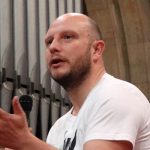Sarah Irving-Stonebraker: How Oxford and Peter Singer drove me from atheism to Jesus
I grew up in Australia, in a loving, secular home, and arrived at Sydney University as a critic of “religion.” I didn’t need faith to ground my identity or my values. I knew from the age of eight that I wanted to study history at Cambridge and become a historian. My identity lay in academic achievement, and my secular humanism was based on self-evident truths. As an undergrad, I won the University Medal and a Commonwealth Scholarship to undertake my Ph.D. in History at King’s College, Cambridge. King’s is known for its secular ideology and my perception of Christianity fitted well with the views of my fellow students: Christians were anti-intellectual and self-righteous.
After Cambridge, I was elected to a Junior Research Fellowship at Oxford. There, I attended three guest lectures by world-class philosopher and atheist public intellectual, Peter Singer. Singer recognised that philosophy faces a vexing problem in relation to the issue of human worth. The natural world yields no egalitarian picture of human capacities. What about the child whose disabilities or illness compromises her abilities to reason? Yet, without reference to some set of capacities as the basis of human worth, the intrinsic value of all human beings becomes an ungrounded assertion; a premise which needs to be agreed upon in before any conversation can take place.
I remember leaving Singer’s lectures with a strange intellectual vertigo; I was committed to believing that universal human value was more than just a well-meaning conceit of liberalism. But I knew from my own research in the history of European empires and their encounters with indigenous cultures, that societies have always had different conceptions of human worth, or lack thereof. The premise of human equality is not a self-evident truth: it is profoundly historically contingent. I began to realise that the implications of my atheism were incompatible with almost every value I held dear.
One afternoon, I noticed that my usual desk in the college library was in front of the Theology section. With an awkward but humble reluctance, I opened a book of sermons by philosopher and theologian Paul Tillich. As I read, I was struck at how intellectually compelling, complex, and profound the gospel was. I was attracted, but I wasn’t convinced.
A few months later, near the end of my time at Oxford, I was invited to a dinner for the International Society for the Study of Science and Religion. I sat next to Professor Andrew Briggs, a Professor of Nanomaterials, who happened to be a Christian. During dinner, Briggs asked me…
Please read the rest of the article on The Veritas Forum website.







